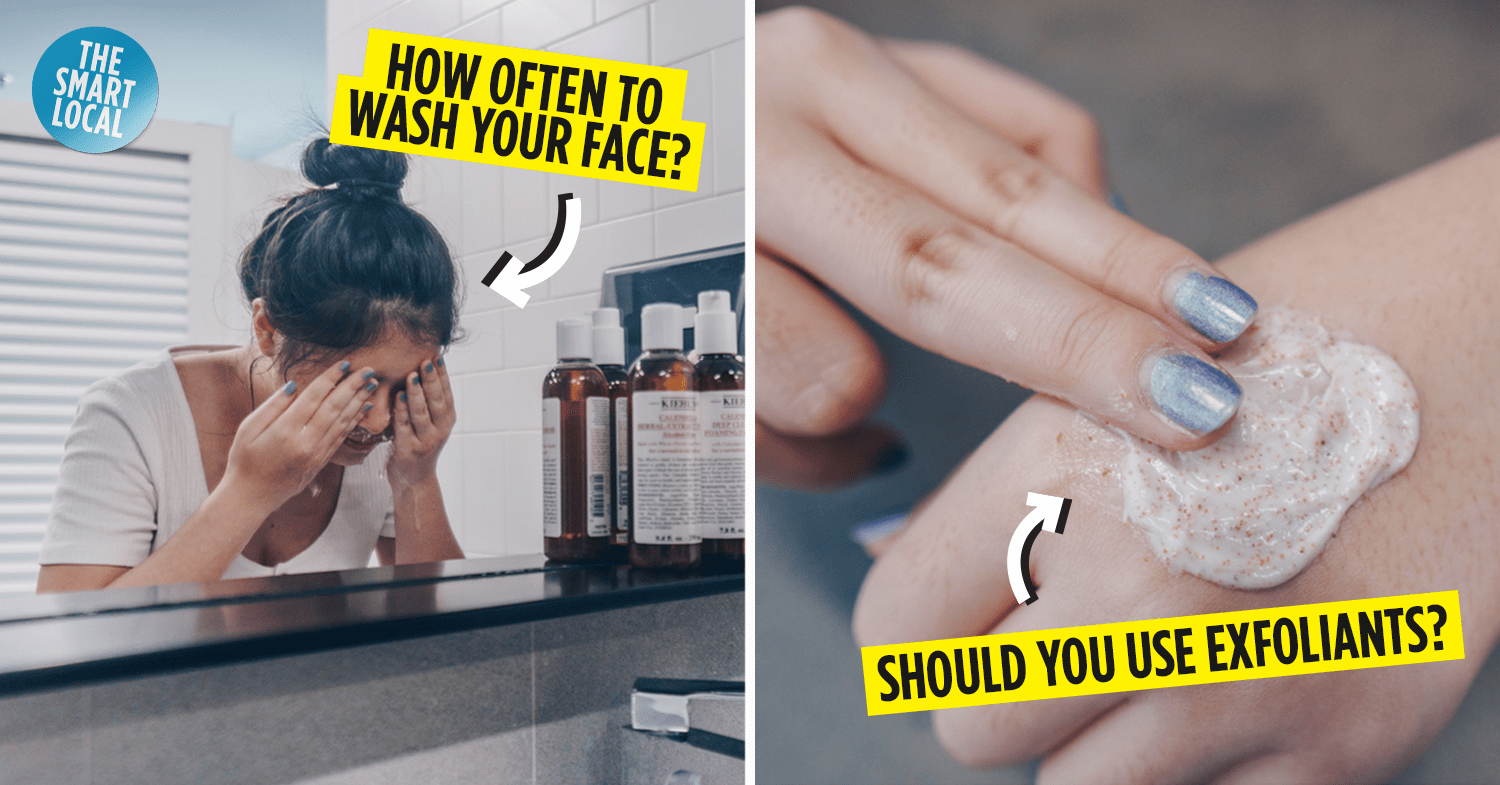Tips to help sensitive skin
People with sensitive skin know the struggle: aggressive maskne, endless pimple breakouts, and the glaring redness. If you’ve been trying product after product to no avail, these eight tips for sensitive skin can help to curb the redness and keep those blemishes at bay.
From things to look out for when picking out makeup products to the best way to wash your face, you’ll be sure to find something that works for you – whether you’re looking to calm major eruptions or maintain your hard-earned dewy skin.
1. Don’t skip out on essentials like sunscreen, moisturiser, and toner
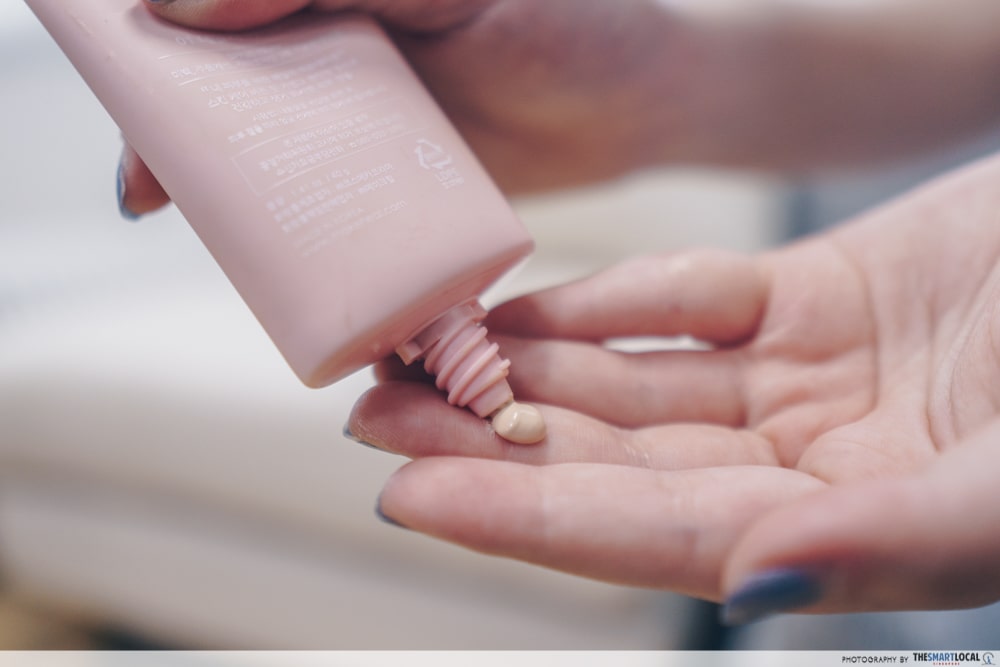
Those with sensitive skin will benefit from mineral sunscreens that contain zinc oxide and titanium dioxide – ingredients that physically absorb UV rays.
Living in Singapore’s climate means that we are constantly exposed to harsh sunlight and high humidity. While many of us know that UV rays can irritate or even damage our skin, fluctuating levels of humidity between our comfy air-conditioned spaces and our tropical outdoors can also wreak havoc, especially for more acne-prone individuals.
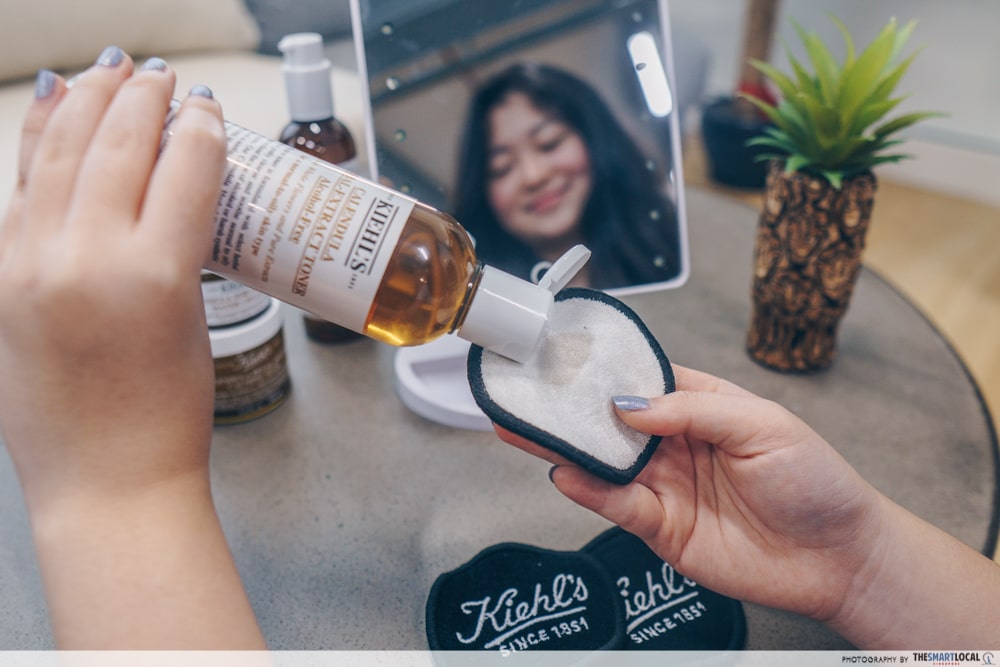
Toners ensure a clean smooth surface for additional products. Applying it with cotton pads can also help absorb impurities on your skin for better cleansing.
Sunscreen is a must-have for those who are constantly out and about, and toners and cleansers are the weapons of choice for those of us constantly perspiring in this humid environment. By gently cleansing our pores and closing them up, toners prevent rashes, bumps and overly-oily skin caused by clogged pores.
For those who seek refuge in air-conditioned spaces 24/7, moisturisers are your best bet to guard against dry, scaly and itchy skin.
Pro tip: Skin toners also help to regulate our skin’s pH level – which is usually around pH 5.5. Those with sensitive skin might experience redness in more acidic conditions, and flakiness when it gets alkaline.
2. Avoid mixing skincare products with harsh ingredients like retinol and acids

Using too many products from different brands can be harsh on your skin as certain chemicals may clash
We’ve all been there – inspired by #GRWM skincare routine videos, and stocking up on a truckload of products, only for our flare-ups to get worse. More skincare products also mean more ingredients being put on already sensitive skin, increasing the chance of irritation. In fact, different active ingredients can react together to cause even more irritation and dryness.
While it’s generally a good practice to keep your skincare routine simple and slowly add products you know you can trust, it also pays to familiarise yourself with the active ingredients in your products. Certain compounds like retinoids and Alpha-hydroxy acids are known to react together, resulting in a chemical that aggressively exfoliates the skin.
3. Avoid harsh exfoliants and scrubs that may further irritate your skin
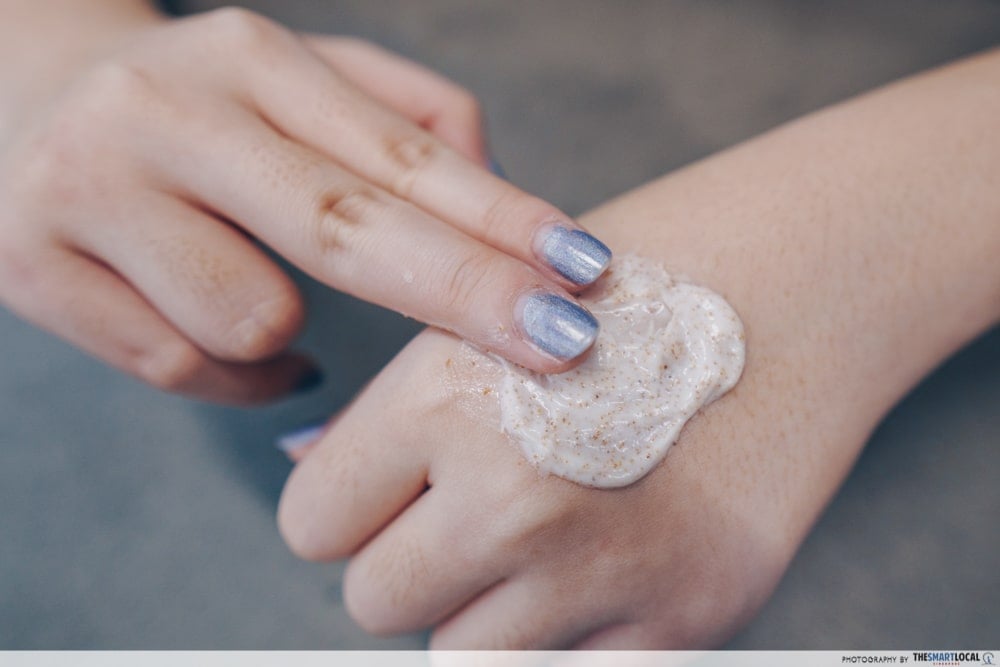
Avoid scrubs and exfoliants with large beads that can be harsh on your skin
Dirt, grime, and a build-up of dead skin cells can worsen sensitivity. While you might be tempted to snag a loofah or an exfoliating skin cleanser for a long-awaited deep cleanse, note that harsh cleansing can aggravate these flare-ups instead. This is especially so with products that contain large particles – that can cause microtears in our skin and worsen dryness and irritation.
However, regular deep cleansing is important for skin health. So, dermatologists instead recommend herbal exfoliants with ingredients like salicylic acid – a compound known for its ability to gently shed dead cells from the topmost layer of your skin.
4. Pay attention to terms like “alcohol-free” and “fragrance-free” in ingredients
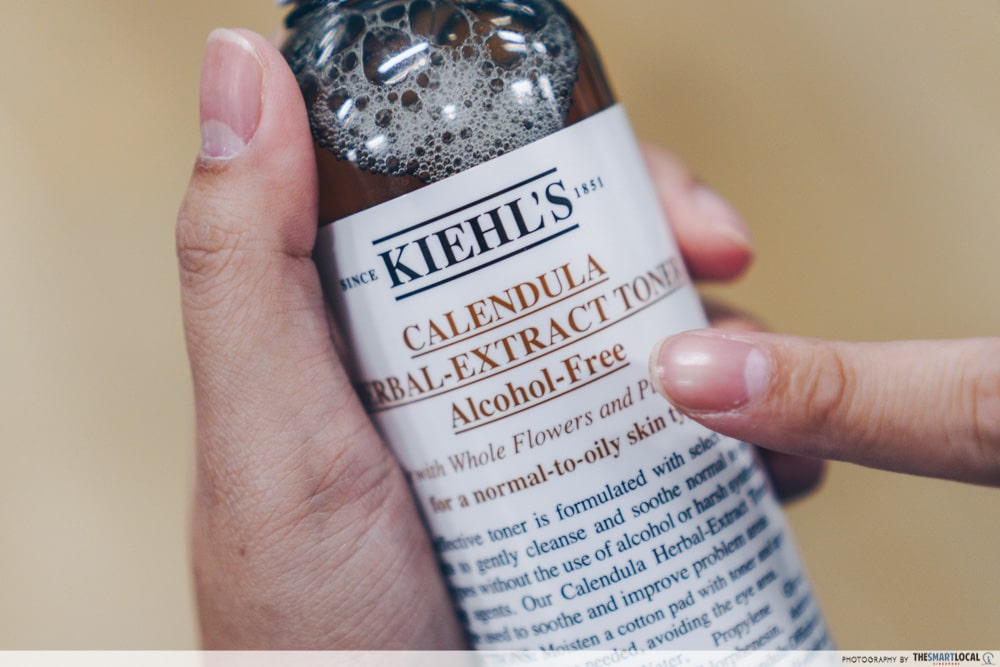
Choose products that are alcohol-free which are more gentle for those with sensitive skin
From glycerin to hyaluronic acid, the ingredients list on skincare products often is a who’s who of cheem chemicals and compounds. But while it might be easier to simply rely on recommendations by friends and YouTubers, you can try your hand at being a beauty guru yourself by learning to look out for key terms on your skincare products.
Products with the terms like “alcohol-free” or “fragrance-free” should be your go-tos. Often the culprit of allergic reactions, artificial fragrances consist of volatile chemicals. On the other hand, alcohol contributes to dry skin. Opting for products without these ingredients provides maximum effectiveness, while utilising fewer active compounds that can interfere with your skin health.
Pro tip: You can also keep a lookout for highly-raved additives like hyaluronic acid and salicylic acid, or seek natural ingredients like rose water and aloe vera – which are known to be gentle on sensitive skin.
5. Wash your skin twice a day at most
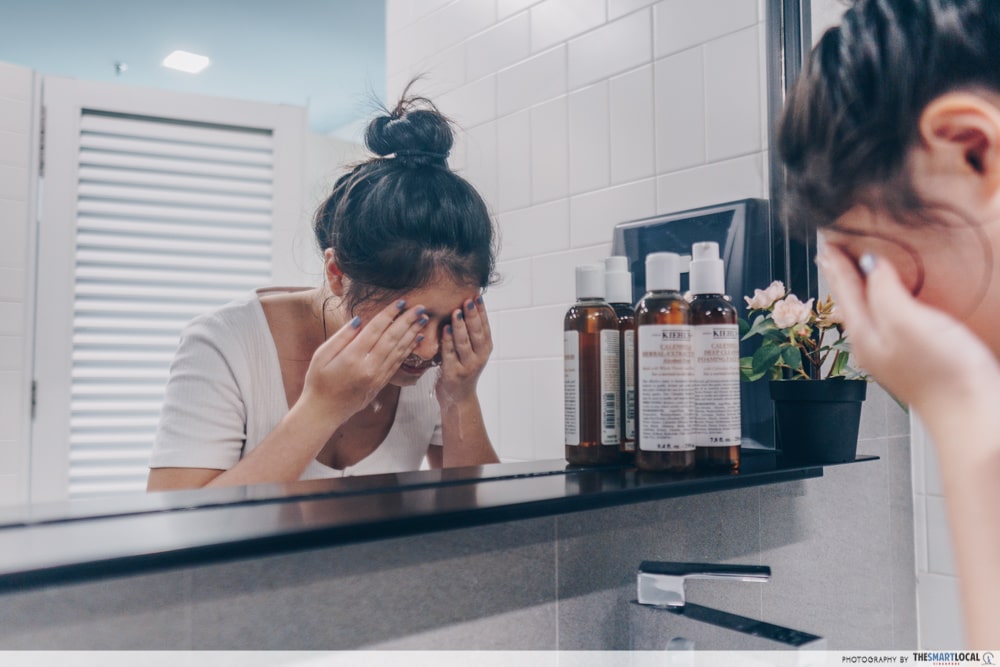
Experts say the best time to wash your face is in the evening – letting you effectively cleanse the dirt from the day.
Whether you’re team wash up once or team shower twice – according to experts, we’re both right. Where this refreshing cleansing ritual might go awry is when we do so more than twice a day – which can cause imbalances in our skin’s natural moisture, oil and pH levels and make it more prone to irritation.
While most of us likely stick to reasonable once- or twice-a-day facial cleansing regimens, watch out for inadvertent extra scrub-downs each day: like freshening up from a noonday siesta or resuscitating yourself from your lunchtime food coma.
6. Wipe down your phone when you reach home
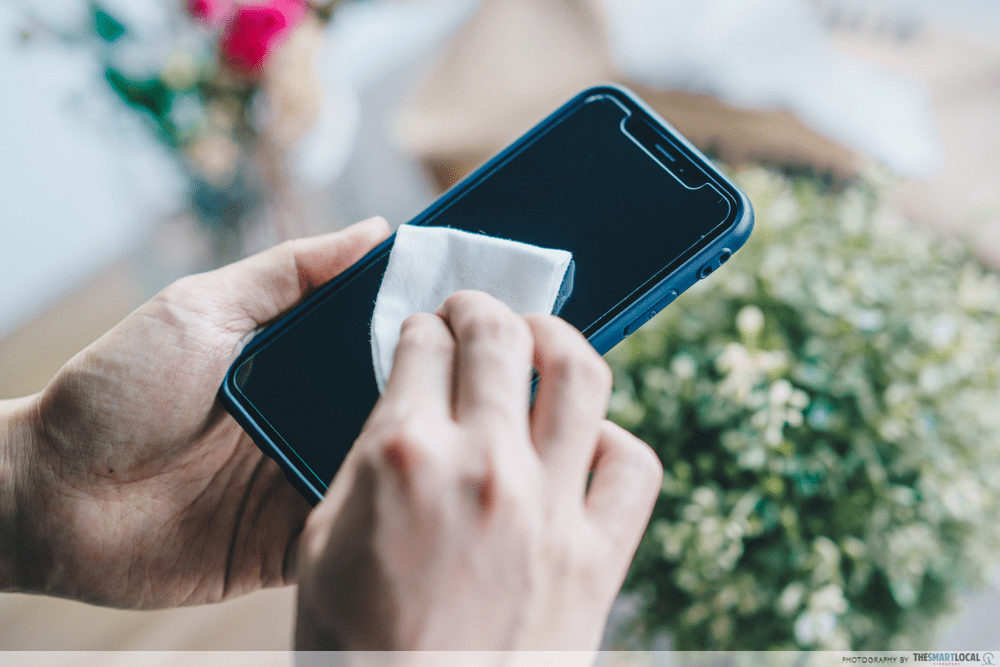
Regularly wipe down your phone with alcohol swabs or wet wipes
We touch plenty of gross things each day – from prodding common surfaces in the lift to visiting the loo, it’s a great thing that most of us wash our hands regularly. But our phones? Whoops.
For a gadget we often hold to our face and place near our pillows, it’s best to ensure that we give our phones a good wipe-down regularly to keep our belongings sanitary. Just a simple water-based wet wipe will do to keep things spick-and-span. Those with especially bad breakouts and redness can consider all-natural organic wipes as a gentler alternative.
7. Try sleeping on your back to avoid having your face come in contact with the pillow

If sleeping on your back isn’t the best option for you, you can always get pillowcases made from silk, satin or linen which don’t trap oils or dirt as easily.
From maintaining a good posture and ensuring clear, snore-free airways to causing wrinkles and puffiness – there’s no end to the debate over which sleeping position is best. But while most experts agree that side sleeping has the best balance of benefits, those with exceptionally sensitive skin should consider sleeping on their backs instead.
This way, you avoid smothering parts of your face in your pillow, while giving your pores space to breathe. It’s definitely worth trying if you constantly suffer from pesky clogged pores and frustrating breakouts when you wake up each morning.
8. Avoid waterproof mascara, liquid eyeliner and old cosmetics
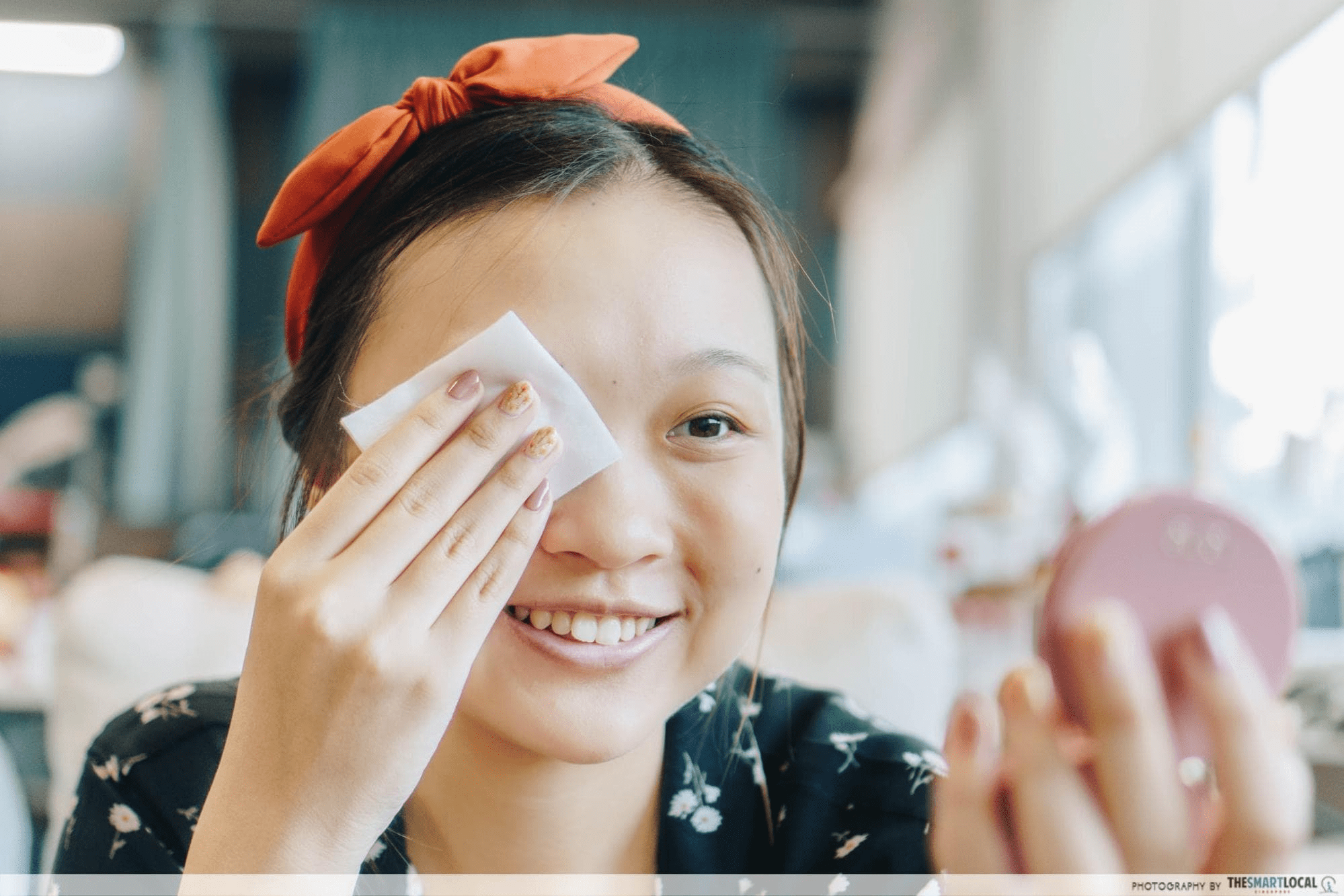
For avid makeup enthusiasts, products that can last the whole day are a considerable premium. However, the stronger and harsher cleansers required to remove these long-lasting products make them not as suitable for those with sensitive skin.
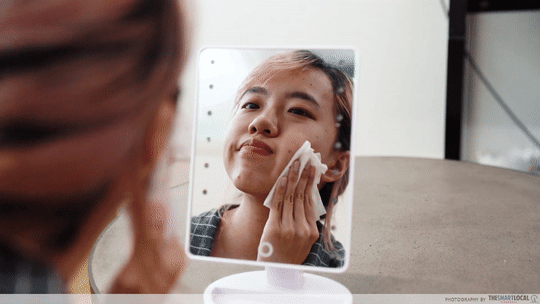
Properly applying toner after cleansing and exfoliating your skin is another way to ensure your makeup stays on for longer
Apart from long-lasting products, another no-no for sensitive skin is old cosmetics. For most people, using products past their due date might just mean flaky mascara and faded bronzer, but some overdue products can actually start to harbour bacteria as preservatives start to break down – creating the risk of infections.
As you remain eagle-eyed on the expiry dates of your makeup collection, pay particular attention to products like foundation and mascara – which can respectively cause widespread breakouts and eye infections.
Pro tip: The due date of your product is usually listed on the packaging, but you can get a better idea of its shelf life with its serial number by using tools like this online cosmetic checker.
Treat your sensitive skin with Kiehl’s Calendula Herbal-Extract Toner
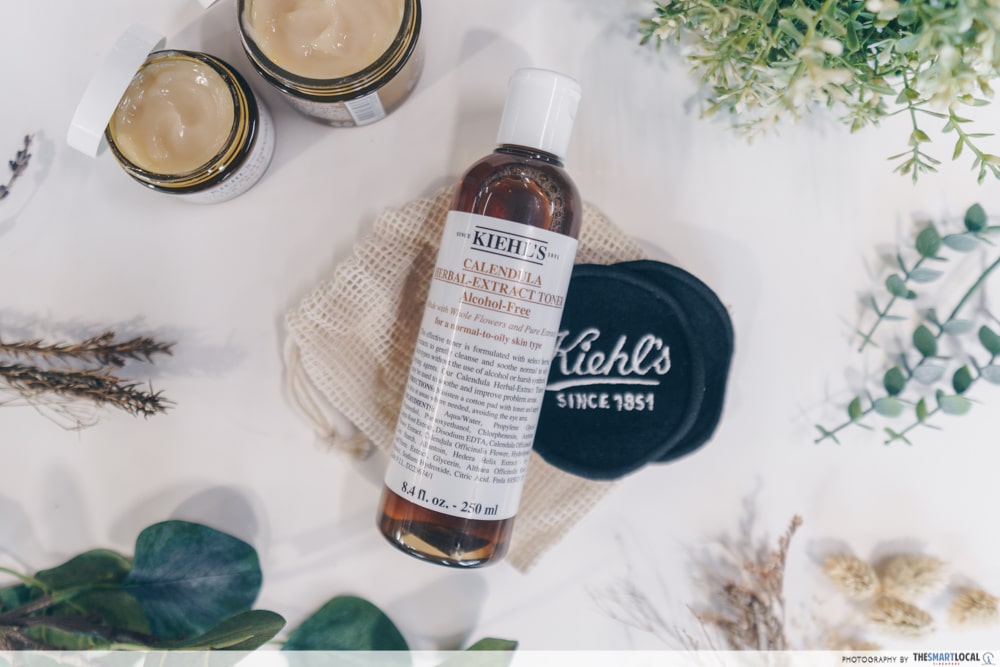
When it comes to sensitive skin, mild yet effective products are key to holding breakouts at bay while restoring your complexion. While other skincare products like sunscreen, cleanser and moisturiser are essential, choosing an all-natural, soothing skin toner like Kiehl’s Calendula Herbal-Extract Toner will thoroughly rid your skin of impurities while refreshing and refining.
With a natural list of ingredients, the toner includes actual calendula petals, which have been clinically tested to soothe distressed skin and reduce the redness of sensitive skin. Apart from calendula’s antifungal, antibacterial and anti-inflammatory properties, the alcohol-free formula is also suitable for both normal and oily skin.
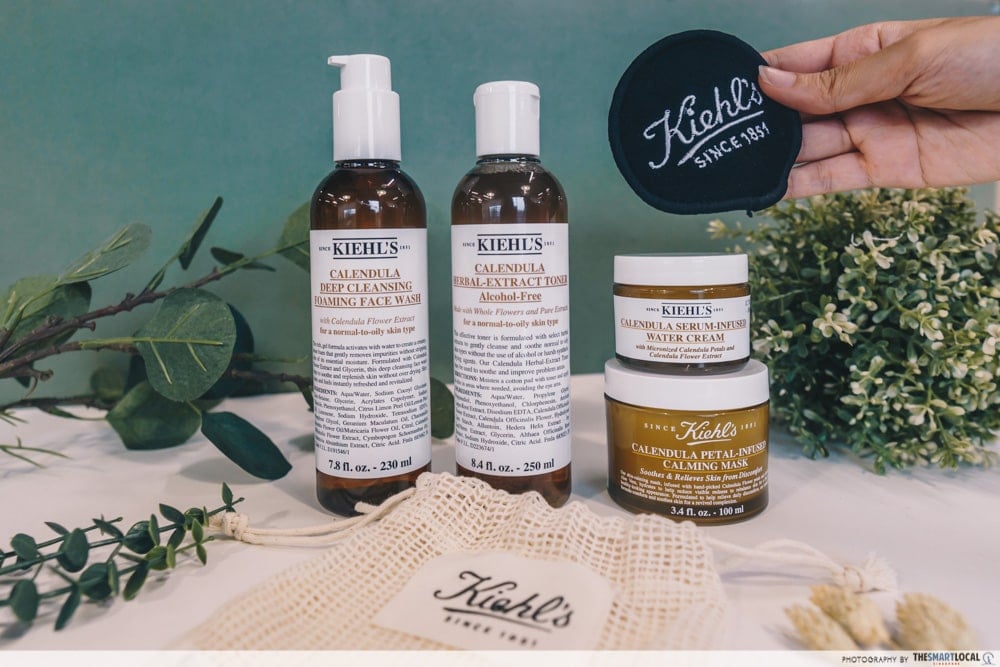
Kiehl’s also has a series of calendula-infused products, including a foaming face wash, calming mask and water cream.
To further enjoy the benefits of calendula, you can also pick up other products from their range – like the Kiehl’s Calendula Deep Cleansing Foaming Face Wash. This deep cleansing face wash is soap-free which is gentle on the skin and includes essential ingredient glycerin to maintain moisture on your skin.
To get started, Kiehl’s Instant Skin Reader gives you a personalised skin analysis, along with a recommended skincare routine – all you need to do is snap a selfie and answer a few questions.
With the right skincare habits and products, you’re now armed with an arsenal of tips and tricks to combat a whole range of symptoms of sensitive skin – be it redness, itchiness or breakouts.
Sign up for your 9-piece Calendula Sample Kit
This post was brought to you by Kiehl’s.
Photography by Natalie Ng.
